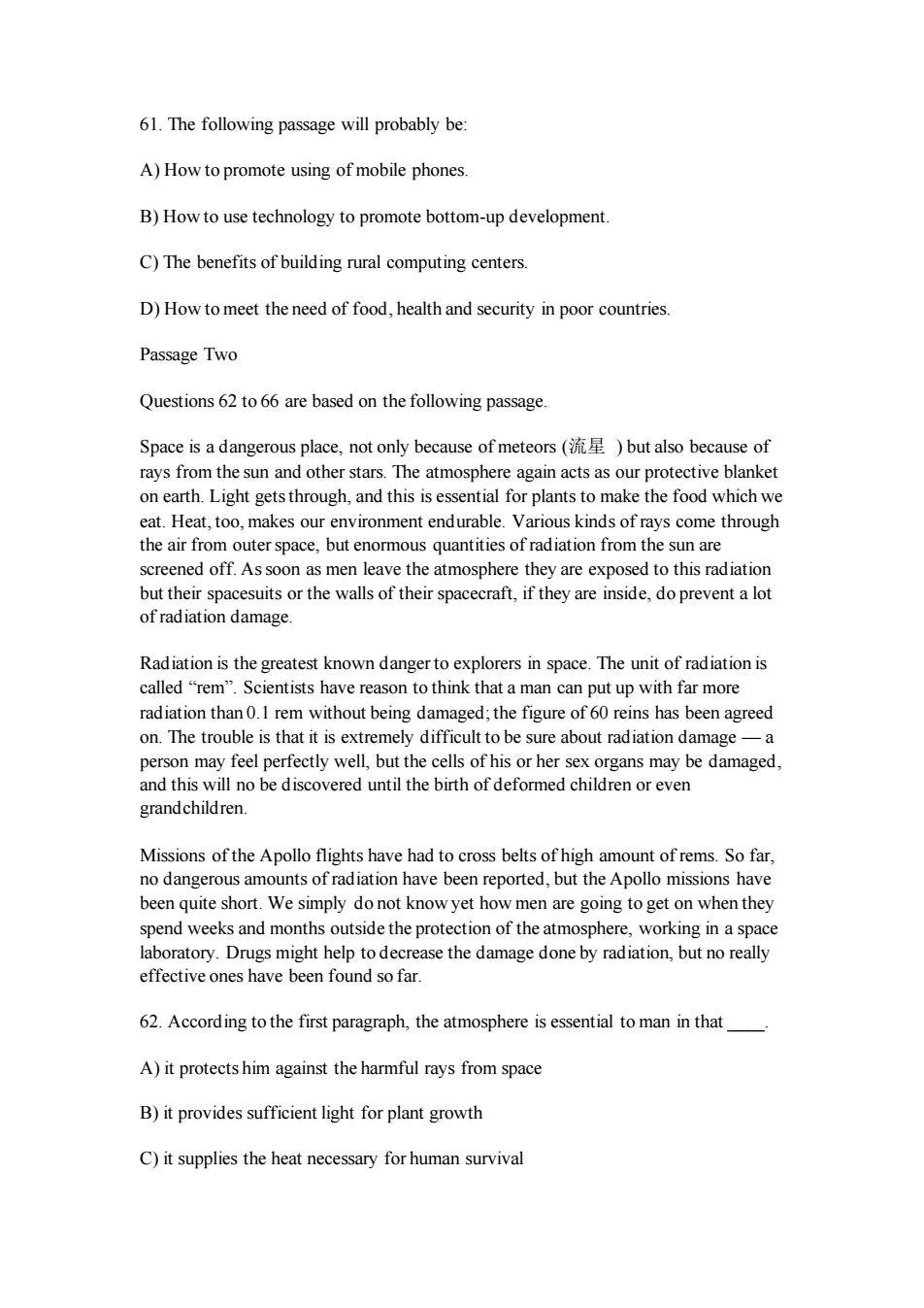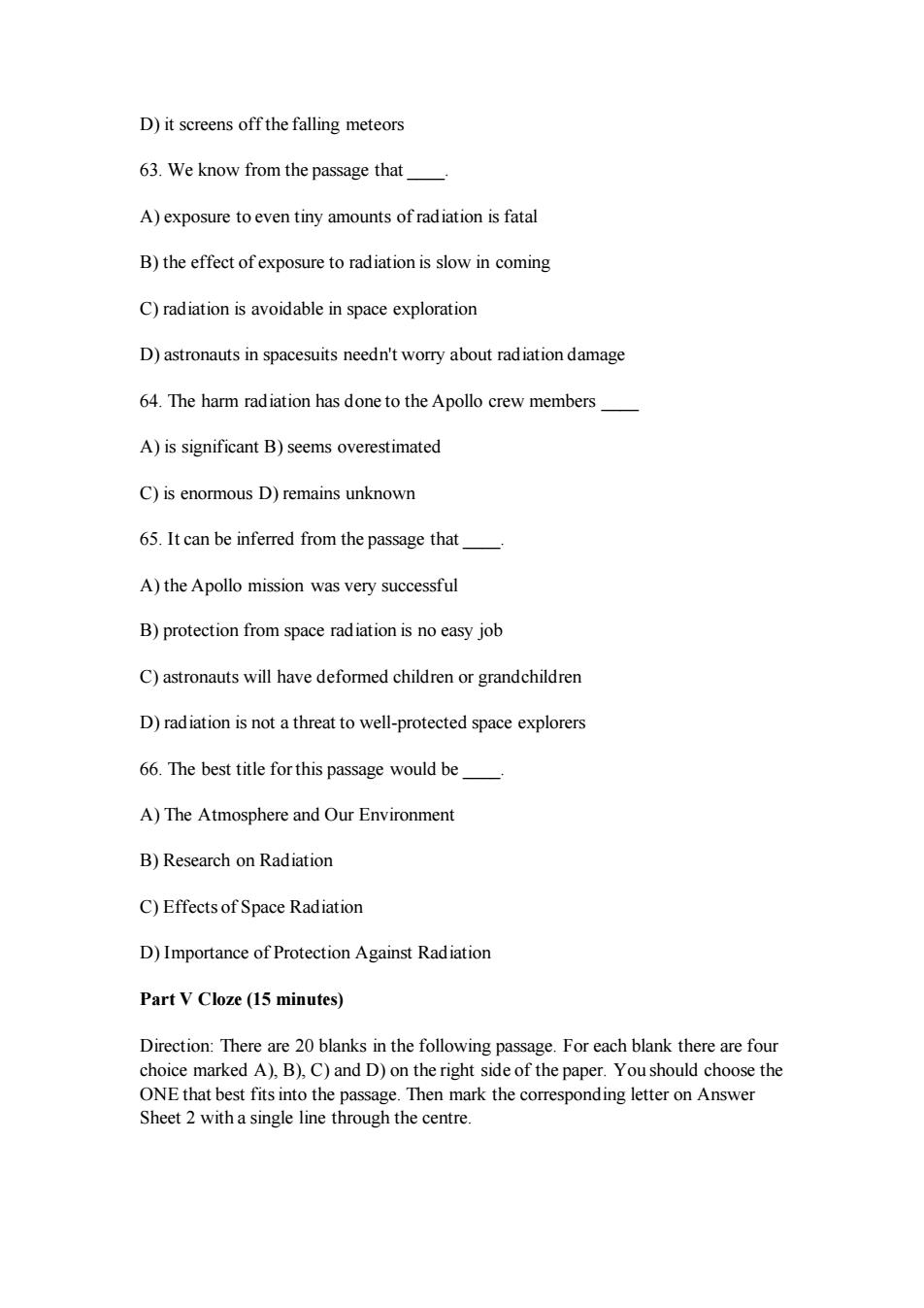
The benefits of building rural c than trying to close the divide for the sake of it,the more sensible goal is to determine how best to use technology to promote bottom-up development.And the answer to that question turns out to be remarkably clear:by promoting the spread not of PCsand the Internet,but of mobile phones. 57.What is the main idea of this passage? A)Plugging poor countries into the Intemet will help them to become rich rapidly B)Poor countries should be given more basic devices other than advanced ones C)Rich countries should help poor ones becoming rich. D)People in poor countries cannot afford devices such as computer. 58.What did the author mean by referring "digital divide.\"(Line 3,Para.1)? A)Digital technology will make the gap between rich world and poor world wider. B)Digital technology will divide people into rich and poor world. C)People can be divided digitally D)To divide people in digital world is wrong 59.We can infer from the 2nd paragraph that A)people in poor countries cannot use computer because of illiteracy. B)poor people cannot use computers. C)there would be no magic to cause a computer toappear in every household on earth. D)people in poor countries need more basic living conditions than computers. 60.Considering the following sentences,which one would the author most agree? A)Digital technology is useless. B)Digital divide will help poor countries becoming rich. C)Poor people need more immediate concems,such as food,health care and security. D)Mobile phones should be promoted firstly
The benefits of building rural computing centers, for example, are unclear. Rather than trying to close the divide for the sake of it, the more sensible goal is to determine how best to use technology to promote bottom-up development. And the answer to that question turns out to be remarkably clear: by promoting the spread not of PCs and the Internet, but of mobile phones. 57. What is the main idea of this passage? A) Plugging poor countries into the Internet will help them to become rich rapidly. B) Poor countries should be given more basic devices other than advanced ones. C) Rich countries should help poor ones becoming rich. D) People in poor countries cannot afford devices such as computer. 58. What did the author mean by referring \"digital divide.\" (Line 3, Para. 1)? A) Digital technology will make the gap between rich world and poor world wider. B) Digital technology will divide people into rich and poor world. C) People can be divided digitally. D) To divide people in digital world is wrong. 59. We can infer from the 2nd paragraph that. A) people in poor countries cannot use computer because of illiteracy. B) poor people cannot use computers. C) there would be no magic to cause a computer to appear in every household on earth. D) people in poor countries need more basic living conditions than computers. 60. Considering the following sentences, which one would the author most agree? A) Digital technology is useless. B) Digital divide will help poor countries becoming rich. C) Poor people need more immediate concerns, such as food, health care and security. D) Mobile phones should be promoted firstly

61.The following passage will probably be: A)How to promote using of mobile phones B)How to use technology to promote bottom-up development C)The benefits of building rural computing centers D)How to meet the need of food,health and security in poor countries. Passage Two Questions 62 to 66 are based on the following passage. Space is a dangerous place,not only because of meteors (but also because of rays from thesun and other stars.The atmospher on earth.Light gets through,and this is essential for plants to make the food which we eat.Heat,too,makes our environment endurable.Various kinds of rays come through the air from outer space,but enormous quantities of radiation from the sun are screened off.As soon as men leave the atmosphere they are exposed to this radiation but their spacesuits or the walls of their spacecraft,if they are inside.oprevent a lot ofradiation damage Radiation is the greatest known dangerto explorers in space.The unit of radiation is called "rem".Scientists have reason to think that a man can put up with far more radiation than0.1 rem without being damaged;the figure of 60 reins has been agreed on.The trouble is that it is extremely difficult to be sure about radiation damage feel perfectly well,b of his or her se organs may be damaged ill no be discovered until the birth of deformed children or ever grandchildren. Missions of the Apollo flights have had to cross belts of high amount of rems.So far, no dangerous amounts of radiation have been reported,but the Apollo missions have been quite short.We simply do not know yet how men are going to get on when they spend weeks and months outside the protection of the atmosphere,working in a space laboratory.Drugs might help to decrease the damage done by rad iation,but no really effective ones have been found so far. 62.According to the first paragraph,the atmosphere is essential to man in that A)it protects him against the harmful rays from space B)it provides sufficient light for plant growth C)it supplies the heat necessary for human survival
61. The following passage will probably be: A) How to promote using of mobile phones. B) How to use technology to promote bottom-up development. C) The benefits of building rural computing centers. D) How to meet the need of food, health and security in poor countries. Passage Two Questions 62 to 66 are based on the following passage. Space is a dangerous place, not only because of meteors (流星 ) but also because of rays from the sun and other stars. The atmosphere again acts as our protective blanket on earth. Light gets through, and this is essential for plants to make the food which we eat. Heat, too, makes our environment endurable. Various kinds of rays come through the air from outer space, but enormous quantities of radiation from the sun are screened off. As soon as men leave the atmosphere they are exposed to this radiation but their spacesuits or the walls of their spacecraft, if they are inside, do prevent a lot of radiation damage. Radiation is the greatest known danger to explorers in space. The unit of radiation is called “rem”. Scientists have reason to think that a man can put up with far more radiation than 0.1 rem without being damaged; the figure of 60 reins has been agreed on. The trouble is that it is extremely difficult to be sure about radiation damage — a person may feel perfectly well, but the cells of his or her sex organs may be damaged, and this will no be discovered until the birth of deformed children or even grandchildren. Missions of the Apollo flights have had to cross belts of high amount of rems. So far, no dangerous amounts of radiation have been reported, but the Apollo missions have been quite short. We simply do not know yet how men are going to get on when they spend weeks and months outside the protection of the atmosphere, working in a space laboratory. Drugs might help to decrease the damage done by radiation, but no really effective ones have been found so far. 62. According to the first paragraph, the atmosphere is essential to man in that ____. A) it protects him against the harmful rays from space B) it provides sufficient light for plant growth C) it supplies the heat necessary for human survival

D)it screens offthe falling meteors 63.We know from the passage that A)exposure toeven tiny amounts of radiation is fatal B)the effect of exposure to radiation is slow in coming C)radiation is avoidable in space exploration D)astronauts in spacesuits needn't worry about radiation damage 64.The harm radiation has done to the Apollo crew members A)is significant B)seems overestimated C)is enormous D)remains unknown 65.It can be inferred from the passage that A)the Apollo mission was very successful B)protection from space radiation is no easy job C)astronauts will have deformed children or grandchildren D)radiation is not a threat to well-protected space explorers 66.The best title forthis passage would be A)The Atmosphere and Our Environmen B)Research on Radiation C)Effects of Space Radiation D)Importance of Protection Against Radiation Part V Cloze(15 minutes) Direction:There are 20 blanks in the following passage.For each blank there are four choice marked A) B).C)and D)on ONE that best the passae e right side of the paper You should choose the Then mark the corresponding letter on Answer Sheet 2 with a single line through the centre
D) it screens off the falling meteors 63. We know from the passage that ____. A) exposure to even tiny amounts of radiation is fatal B) the effect of exposure to radiation is slow in coming C) radiation is avoidable in space exploration D) astronauts in spacesuits needn't worry about radiation damage 64. The harm radiation has done to the Apollo crew members ____ A) is significant B) seems overestimated C) is enormous D) remains unknown 65. It can be inferred from the passage that ____. A) the Apollo mission was very successful B) protection from space radiation is no easy job C) astronauts will have deformed children or grandchildren D) radiation is not a threat to well-protected space explorers 66. The best title for this passage would be ____. A) The Atmosphere and Our Environment B) Research on Radiation C) Effects of Space Radiation D) Importance of Protection Against Radiation Part V Cloze (15 minutes) Direction: There are 20 blanks in the following passage. For each blank there are four choice marked A), B), C) and D) on the right side of the paper. You should choose the ONE that best fits into the passage. Then mark the corresponding letter on Answer Sheet 2 with a single line through the centre